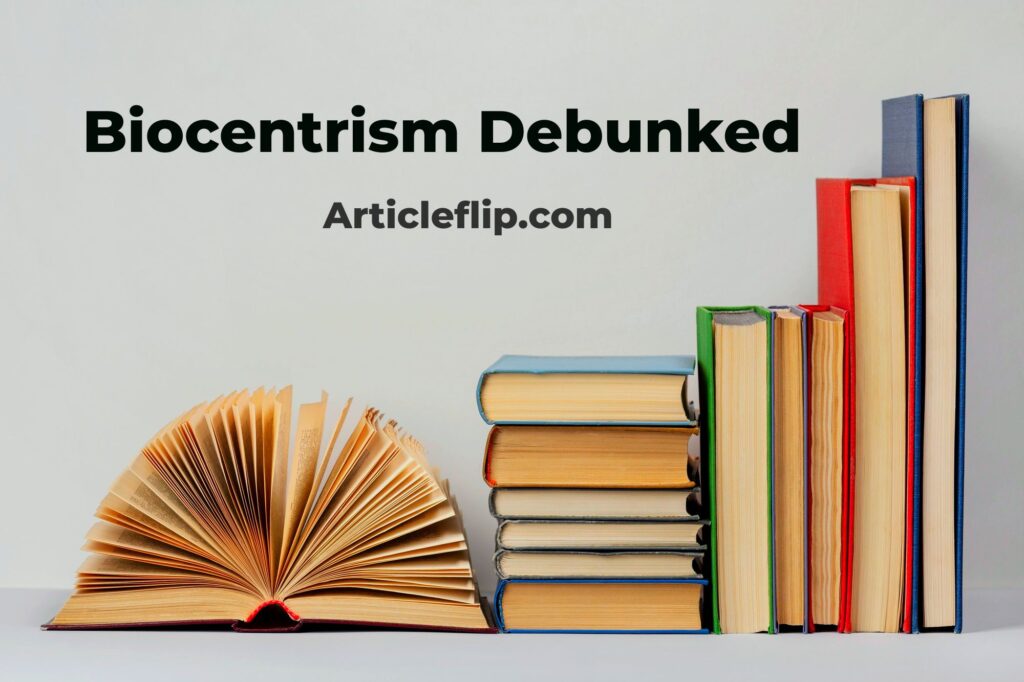Table of Contents

Biocentrism Debunked, a theory proposing that life is the central and most significant element in the universe, has sparked fervent debates among scientists, philosophers, and ethicists. Advocates of biocentrism argue that all life forms hold inherent value and deserve ethical consideration. However, this theory faces substantial opposition, with detractors critically examining its principles and implications.
Exploring Biocentrism Debunked
What Biocentrism Debunked Means
At its core, biocentrism Debunked asserts that life, in any form, holds primary importance in the cosmos. It suggests that the existence and experiences of living organisms are the pivotal factors shaping the universe.
Pioneers behind Biocentrism
Notable figures like Dr. Robert Lanza and ecologist Dr. Paul Taylor contributed significantly to the development and popularization of biocentric thought.
Evolution of Biocentric Thought
Biocentrism Debunked evolved from earlier philosophical and scientific concepts, challenging traditional anthropocentric viewpoints that place humans at the center of existence.
Key Tenets of Biocentrism
The theory postulates the interconnectedness of all life forms and emphasizes the ethical obligation to respect and protect all living entities.
Challenging Biocentrism
Scientific Refutation of Biocentrism
Critics argue that while biocentrism presents an intriguing perspective, empirical evidence and established scientific principles often fail to support its claims conclusively.
Philosophical Criticisms
Philosophers scrutinize biocentrism’s foundational principles, highlighting inconsistencies and oversights that raise questions about its philosophical validity.
Ethical Dilemmas and Biocentrism
Ethicists debate whether biocentrism oversimplifies complex ethical considerations by placing excessive emphasis on life-centric values the neglecting other crucial aspects.
A Critical Examination
Flaws in Biocentrism’s Arguments
Upon meticulous examination, various shortcomings and logical gaps emerge within biocentrism’s arguments, challenging its credibility.
Alternative Theories and Approaches
In response to the limitations of biocentrism, alternative ethical and philosophical frameworks have emerged, offering different perspectives on humanity’s relationship with the natural world.
Biocentrism’s Impact on Scientific Discourse
While biocentrism sparks intellectual discourse, its contentious nature and inconclusive evidence have limited its integration into mainstream scientific thought.
Biocentrism Debunked: A Critical Look at a Controversial Theory
Debunking Biocentrism’s Claims
Critics contend that biocentrism lacks concrete evidence to substantiate its assertions, thereby casting doubt on the theory’s validity and scientific standing.
The Ethical Predicament
Critics argue that biocentrism’s oversimplified ethical stance may neglect crucial ethical considerations beyond life-centric values.
Philosophical Inconsistencies
Examination of the theory reveals inherent philosophical inconsistencies, raising substantial concerns regarding the coherence and plausibility of biocentric principles.
FAQs
What is the core premise of biocentrism?
Biocentrism asserts that life is the central organizing principle of the universe, attributing significant value to all living entities.
How does biocentrism differ from anthropocentrism?
Unlike anthropocentrism which places humans at the center, biocentrism advocates for the intrinsic value of all life forms.
Is biocentrism gaining traction among modern scientific communities?
While biocentrism has intrigued some thinkers, widespread acceptance within scientific circles remains elusive due to the lack of empirical support.
Can biocentrism be reconciled with other philosophical and ethical theories?
Efforts are underway to reconcile biocentrism with other ethical and philosophical perspectives, seeking a harmonious integration of diverse viewpoints.
Are there any practical applications stemming from biocentric thought?
While biocentrism offers a unique ethical perspective, practical applications require further development and examination within real-world contexts.
What are the significant critiques against biocentrism?
Critics primarily question biocentrism’s empirical foundation, oversimplified ethical framework, and philosophical inconsistencies.
Conclusion
In conclusion, the discourse surrounding [Biocentrism Debunked: A Critical Look at a Controversial Theory] illustrates the complex interplay between scientific, ethical, and philosophical dimensions. While proponents advocate for its intrinsic value, substantial challenges and critiques underline the need for continued examination and refinement within the scientific and philosophical realms.
If you found our content helpful don’t forget to share it on your social media: Twitter
More Related Articles:
